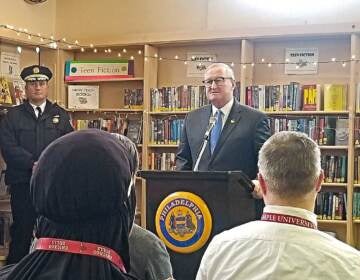N.J. Center on Gun Violence Research wants ‘all hands on deck’ approach to stem shootings
Researchers say addressing gun violence will take time, but starts with better data.

Dr. Stephanie Bonne is director of surveillance for New Jersey's Center on Gun Violence Research. She answered questions from the audience during the center's first conference at Rutgers University in New Brunswick. (Ximena Conde/WHYY)
“There are only two people in the world that can tell you the difference between what a handgun or an AR-15 does to someone’s liver. And it’s me and the coroner,” said Newark trauma surgeon Stephanie Bonne to a room full of researchers and gun-control advocates at Rutgers University’s New Brunswick Campus.
Bonne was making the case Tuesday that medical professionals should be at the table for discussions of gun violence. Historically, she said, the issue has been looked at through a criminal justice lens.
Bonne, director of data surveillance for the newly established New Jersey’s Center on Gun Violence Research, said she’s looking to collect better data on nonlethal shootings.
One of the first of its kind in the country, the Rutgers University-based center was allotted $2 million in November by the state. It wants to pull people from different disciplines — including psychology, sociology and social work from Rutgers and beyond— to get a better idea of who is being shot and why.
This way, she said, the state can better inform its prevention efforts and direct resources to the communities that need the most help.
“We can form a network of stakeholders and relationships with folks throughout the community at the state and local levels that can help to form a continuous feedback loop for us to understand what the issues are and to answer questions that are generated by our communities,” said center co-director Bernadette Hohl, who anticipates researchers will build synergies in their work.
Researchers said gun violence costs the state a total of $1.2 billion once you tally the toll on health care, lost wages and the criminal justice system.
That’s in addition to the cost of life. In New Jersey, that’s about 475 firearm related deaths per year.
Speakers said more research would supplement what we already know about gun violence — that black youth are 10 times more likely to be killed with a gun compared with their white counterparts or that firearms are the second-leading cause of death for children under 18 in the U.S.
Settling in for the long haul
Gov. Phil Murphy insisted the state is not against guns. But he said the only choice for
New Jersey and other states is to work on preventing gun violence on their own since Congress has failed to pass meaningful gun laws.
Murphy said the U.S. is still reeling from the effects of the Dickey Amendment, legislation that ultimately stopped the Centers for Disease Control and Prevention from studying gun violence.
“To more effectively combat the scourge of gun violence, we must undertake the important multidisciplinary research that Congress had blocked for more than two decades,” he said.
However, the process will take time, even after the basic infrastructure is set up.
“I’m a surgeon, so I fix things right in front of me in a couple of hours, and there’s this great feeling of accomplishment. But this isn’t like that, this isn’t a discrete thing that’s just one and done,” Bonne said.
“It’s not going to happen in a couple of months and then we’re all going to pat each other on the back and say we solved this problem. This is going to be an ongoing thing.”
Bonne said she hopes to have the basic framework for her research project ready this summer.
WHYY is your source for fact-based, in-depth journalism and information. As a nonprofit organization, we rely on financial support from readers like you. Please give today.





